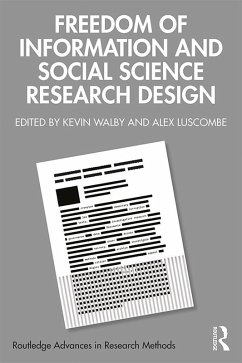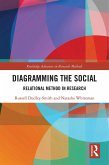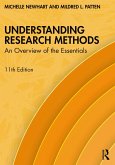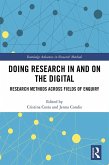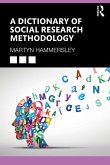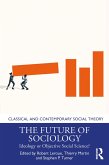Freedom of Information and Social Science Research Design (eBook, ePUB)
Redaktion: Walby, Kevin; Luscombe, Alex
40,95 €
40,95 €
inkl. MwSt.
Sofort per Download lieferbar

20 °P sammeln
40,95 €
Als Download kaufen

40,95 €
inkl. MwSt.
Sofort per Download lieferbar

20 °P sammeln
Jetzt verschenken
Alle Infos zum eBook verschenken
40,95 €
inkl. MwSt.
Sofort per Download lieferbar
Alle Infos zum eBook verschenken

20 °P sammeln
Freedom of Information and Social Science Research Design (eBook, ePUB)
Redaktion: Walby, Kevin; Luscombe, Alex
- Format: ePub
- Merkliste
- Auf die Merkliste
- Bewerten Bewerten
- Teilen
- Produkt teilen
- Produkterinnerung
- Produkterinnerung

Bitte loggen Sie sich zunächst in Ihr Kundenkonto ein oder registrieren Sie sich bei
bücher.de, um das eBook-Abo tolino select nutzen zu können.
Hier können Sie sich einloggen
Hier können Sie sich einloggen
Sie sind bereits eingeloggt. Klicken Sie auf 2. tolino select Abo, um fortzufahren.

Bitte loggen Sie sich zunächst in Ihr Kundenkonto ein oder registrieren Sie sich bei bücher.de, um das eBook-Abo tolino select nutzen zu können.
This multidisciplinary volume demonstrates how freedom of information law and processes can contribute to social science research design, explores the challenges of using freedom of information processes in research and considers the reasons for which freedom of information processes remain under-used in social scientific research.
- Geräte: eReader
- ohne Kopierschutz
- eBook Hilfe
- Größe: 0.83MB
Andere Kunden interessierten sich auch für
![Diagramming the Social (eBook, ePUB) Diagramming the Social (eBook, ePUB)]() Russell Dudley-SmithDiagramming the Social (eBook, ePUB)44,95 €
Russell Dudley-SmithDiagramming the Social (eBook, ePUB)44,95 €![Understanding Research Methods (eBook, ePUB) Understanding Research Methods (eBook, ePUB)]() Michelle NewhartUnderstanding Research Methods (eBook, ePUB)97,95 €
Michelle NewhartUnderstanding Research Methods (eBook, ePUB)97,95 €![Doing Research In and On the Digital (eBook, ePUB) Doing Research In and On the Digital (eBook, ePUB)]() Doing Research In and On the Digital (eBook, ePUB)44,95 €
Doing Research In and On the Digital (eBook, ePUB)44,95 €![A Dictionary of Social Research Methodology (eBook, ePUB) A Dictionary of Social Research Methodology (eBook, ePUB)]() Martyn HammersleyA Dictionary of Social Research Methodology (eBook, ePUB)40,95 €
Martyn HammersleyA Dictionary of Social Research Methodology (eBook, ePUB)40,95 €![The Illustrated Guide to Social Science Research (eBook, ePUB) The Illustrated Guide to Social Science Research (eBook, ePUB)]() Divya SharmaThe Illustrated Guide to Social Science Research (eBook, ePUB)40,95 €
Divya SharmaThe Illustrated Guide to Social Science Research (eBook, ePUB)40,95 €![A Practical Guide to Theoretical Frameworks for Social Science Research (eBook, ePUB) A Practical Guide to Theoretical Frameworks for Social Science Research (eBook, ePUB)]() Andrea J. BinghamA Practical Guide to Theoretical Frameworks for Social Science Research (eBook, ePUB)48,95 €
Andrea J. BinghamA Practical Guide to Theoretical Frameworks for Social Science Research (eBook, ePUB)48,95 €![The Future of Sociology (eBook, ePUB) The Future of Sociology (eBook, ePUB)]() The Future of Sociology (eBook, ePUB)39,95 €
The Future of Sociology (eBook, ePUB)39,95 €-
-
-
This multidisciplinary volume demonstrates how freedom of information law and processes can contribute to social science research design, explores the challenges of using freedom of information processes in research and considers the reasons for which freedom of information processes remain under-used in social scientific research.
Dieser Download kann aus rechtlichen Gründen nur mit Rechnungsadresse in A, B, BG, CY, CZ, D, DK, EW, E, FIN, F, GR, HR, H, IRL, I, LT, L, LR, M, NL, PL, P, R, S, SLO, SK ausgeliefert werden.
Produktdetails
- Produktdetails
- Verlag: Taylor & Francis eBooks
- Seitenzahl: 266
- Erscheinungstermin: 25. November 2019
- Englisch
- ISBN-13: 9780429794865
- Artikelnr.: 58310157
- Verlag: Taylor & Francis eBooks
- Seitenzahl: 266
- Erscheinungstermin: 25. November 2019
- Englisch
- ISBN-13: 9780429794865
- Artikelnr.: 58310157
- Herstellerkennzeichnung Die Herstellerinformationen sind derzeit nicht verfügbar.
Kevin Walby is Associate Professor of Criminal Justice at the University of Winnipeg, Canada. He is the author of Touching Encounters: Sex, Work and Male-for-Male Internet Escorting and the co-author of Municipal Corporate Security in International Context as well as A Criminology of Policing and Security Frontiers. He is the co-editor of Access to Information and Social Justice: Critical Research Strategies for Journalists, Scholars and Activists; Brokering Access: Power, Politics and Freedom of Information Process in Canada; The Handbook of Prison Tourism; Corporatizing Canada: Making Business Out of Public Service; National Security, Surveillance, and Terror: Canada and Australia in Comparative Perspective; Policing Cities: Urban Securitization and Regulation in a 21st Century World and Corporate Security in the 21st Century: Theory and Practice in International Perspective. He is co-editor of the Journal of Prisoners on Prisons. Alex Luscombe is a PhD Candidate in criminology at the University of Toronto, Canada. He has published widely on issues of policing, corruption, secrecy and Freedom of Information law in Canada and beyond. His past research has appeared in Social Forces, British Journal of Criminology, Sociology, International Political Sociology, Canadian Journal of Criminology & Criminal Justice, Policing & Society, Criminology & Criminal Justice, as well as a number of other academic journals and edited volumes. He serves on the editorial board of Criminological Highlights, a University of Toronto publication aimed at providing criminal justice practitioners with an accessible overview of recent criminological research. He is also a Junior Fellow at the University of Toronto's Massey College.
Foreword: Thinking About Access Introduction: Freedom of Information and
Research Design in International Perspective Part 1: Freedom of Information
and Research Design: The Foundations 1. Designing Research Using FOI
Requests in the USA 2. Accessing Information in South Africa 3. UK
Experience of Freedom of Information as a Method of Enquiry 4. Using FOI to
Explore Governance and Decision-Making in the UK Part 2: Freedom of
Information and Research Design: Disciplinary Applications 5. Freedom of
Information and Australian Criminology 6. Accessing Information in a
Technology Industry: Tracing Canadian Drone Stakeholders and Negotiating
Access 7. Using Continuous FOI Requests to Uncover the Live Archive:
Tracking Protest Policing in the USA Part 3: Freedom of Information:
Triangulation, Data Analysis and Exposition 8. Piecing it Together,
Studying Public-Private Partnerships: Freedom of Information as Oligoptic
Technologies 9. Researching the Complexities of Knowledge Contestations and
Occupational Disease Recognition: FOI Requests in Multi-Method Qualitative
Research Design 10. Repertoires of Empirical Social Science and Freedom of
Information Requests: Four Techniques for Analyzing Disclosures Part 4:
Freedom of Information and Research Design: Challenges and Dilemmas 11.
Analysing Public Policy in the UK: Seeing through the Secrecy, Obfuscation
and Obstruction of the FOIA by the Home Office 12. A Double-Edged Sword?
Freedom of Information as a Method in Social Research 13. The Falling
Currency of Democracy: Information as an Instrument of Control and
Certainty in the Postwar and Post-Truth Eras Postscript: Access in the
Absence of FOI: Open Source Investigations and Strategies of Verification
Research Design in International Perspective Part 1: Freedom of Information
and Research Design: The Foundations 1. Designing Research Using FOI
Requests in the USA 2. Accessing Information in South Africa 3. UK
Experience of Freedom of Information as a Method of Enquiry 4. Using FOI to
Explore Governance and Decision-Making in the UK Part 2: Freedom of
Information and Research Design: Disciplinary Applications 5. Freedom of
Information and Australian Criminology 6. Accessing Information in a
Technology Industry: Tracing Canadian Drone Stakeholders and Negotiating
Access 7. Using Continuous FOI Requests to Uncover the Live Archive:
Tracking Protest Policing in the USA Part 3: Freedom of Information:
Triangulation, Data Analysis and Exposition 8. Piecing it Together,
Studying Public-Private Partnerships: Freedom of Information as Oligoptic
Technologies 9. Researching the Complexities of Knowledge Contestations and
Occupational Disease Recognition: FOI Requests in Multi-Method Qualitative
Research Design 10. Repertoires of Empirical Social Science and Freedom of
Information Requests: Four Techniques for Analyzing Disclosures Part 4:
Freedom of Information and Research Design: Challenges and Dilemmas 11.
Analysing Public Policy in the UK: Seeing through the Secrecy, Obfuscation
and Obstruction of the FOIA by the Home Office 12. A Double-Edged Sword?
Freedom of Information as a Method in Social Research 13. The Falling
Currency of Democracy: Information as an Instrument of Control and
Certainty in the Postwar and Post-Truth Eras Postscript: Access in the
Absence of FOI: Open Source Investigations and Strategies of Verification
Foreword: Thinking About Access Introduction: Freedom of Information and
Research Design in International Perspective Part 1: Freedom of Information
and Research Design: The Foundations 1. Designing Research Using FOI
Requests in the USA 2. Accessing Information in South Africa 3. UK
Experience of Freedom of Information as a Method of Enquiry 4. Using FOI to
Explore Governance and Decision-Making in the UK Part 2: Freedom of
Information and Research Design: Disciplinary Applications 5. Freedom of
Information and Australian Criminology 6. Accessing Information in a
Technology Industry: Tracing Canadian Drone Stakeholders and Negotiating
Access 7. Using Continuous FOI Requests to Uncover the Live Archive:
Tracking Protest Policing in the USA Part 3: Freedom of Information:
Triangulation, Data Analysis and Exposition 8. Piecing it Together,
Studying Public-Private Partnerships: Freedom of Information as Oligoptic
Technologies 9. Researching the Complexities of Knowledge Contestations and
Occupational Disease Recognition: FOI Requests in Multi-Method Qualitative
Research Design 10. Repertoires of Empirical Social Science and Freedom of
Information Requests: Four Techniques for Analyzing Disclosures Part 4:
Freedom of Information and Research Design: Challenges and Dilemmas 11.
Analysing Public Policy in the UK: Seeing through the Secrecy, Obfuscation
and Obstruction of the FOIA by the Home Office 12. A Double-Edged Sword?
Freedom of Information as a Method in Social Research 13. The Falling
Currency of Democracy: Information as an Instrument of Control and
Certainty in the Postwar and Post-Truth Eras Postscript: Access in the
Absence of FOI: Open Source Investigations and Strategies of Verification
Research Design in International Perspective Part 1: Freedom of Information
and Research Design: The Foundations 1. Designing Research Using FOI
Requests in the USA 2. Accessing Information in South Africa 3. UK
Experience of Freedom of Information as a Method of Enquiry 4. Using FOI to
Explore Governance and Decision-Making in the UK Part 2: Freedom of
Information and Research Design: Disciplinary Applications 5. Freedom of
Information and Australian Criminology 6. Accessing Information in a
Technology Industry: Tracing Canadian Drone Stakeholders and Negotiating
Access 7. Using Continuous FOI Requests to Uncover the Live Archive:
Tracking Protest Policing in the USA Part 3: Freedom of Information:
Triangulation, Data Analysis and Exposition 8. Piecing it Together,
Studying Public-Private Partnerships: Freedom of Information as Oligoptic
Technologies 9. Researching the Complexities of Knowledge Contestations and
Occupational Disease Recognition: FOI Requests in Multi-Method Qualitative
Research Design 10. Repertoires of Empirical Social Science and Freedom of
Information Requests: Four Techniques for Analyzing Disclosures Part 4:
Freedom of Information and Research Design: Challenges and Dilemmas 11.
Analysing Public Policy in the UK: Seeing through the Secrecy, Obfuscation
and Obstruction of the FOIA by the Home Office 12. A Double-Edged Sword?
Freedom of Information as a Method in Social Research 13. The Falling
Currency of Democracy: Information as an Instrument of Control and
Certainty in the Postwar and Post-Truth Eras Postscript: Access in the
Absence of FOI: Open Source Investigations and Strategies of Verification
